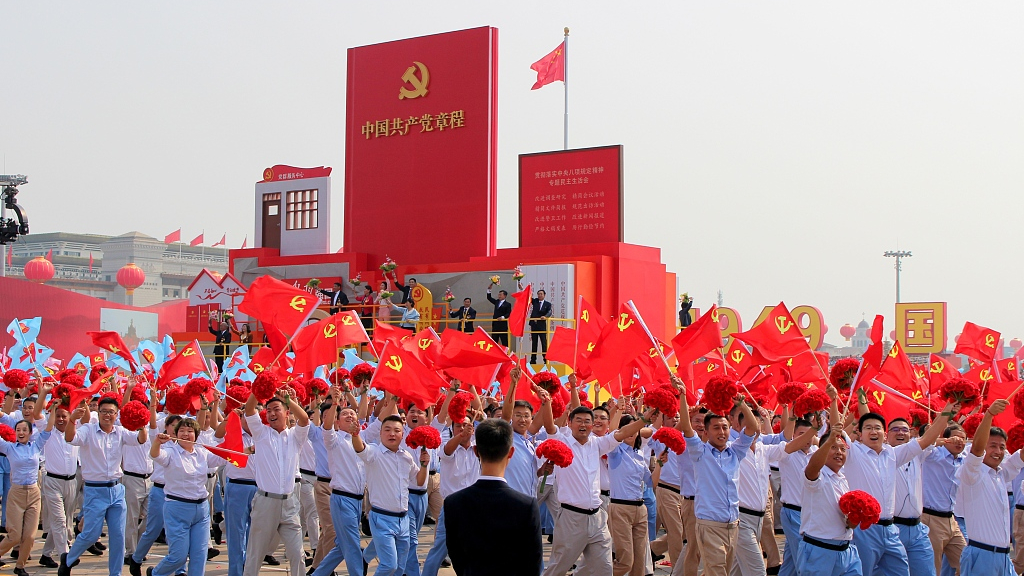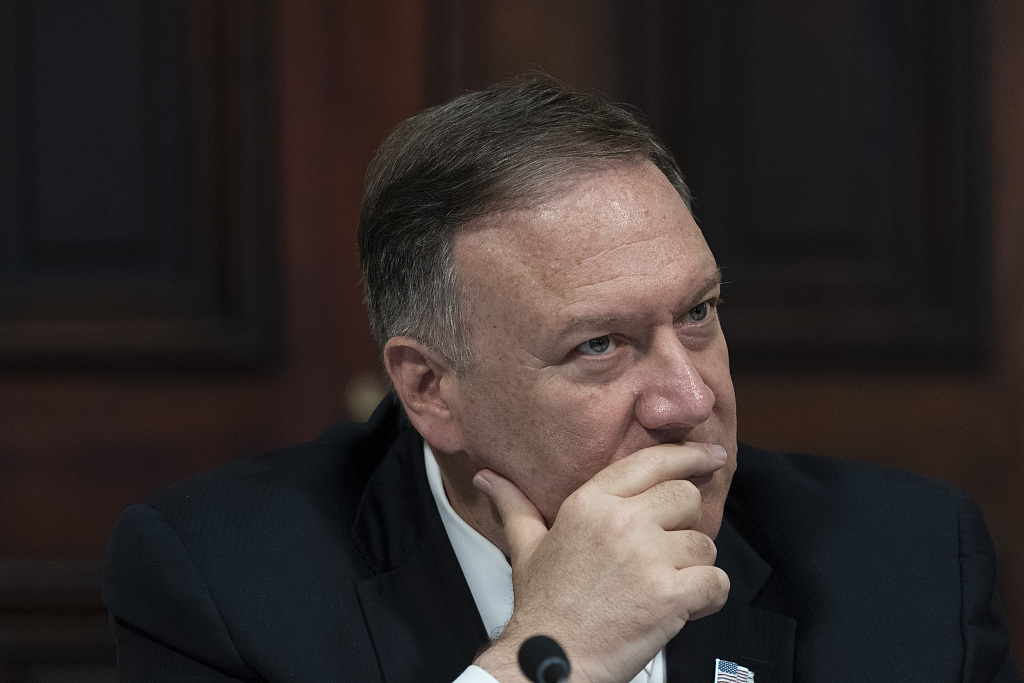
Participants wave flags of the Communist Party of China (CPC) during a parade in Beijing's Tiananmen Square marking the 70th anniversary of the founding of the People's Republic of China, October 1, 2019. /VCG Photo
Participants wave flags of the Communist Party of China (CPC) during a parade in Beijing's Tiananmen Square marking the 70th anniversary of the founding of the People's Republic of China, October 1, 2019. /VCG Photo
Editor's note: Azhar Azam works in a private organization as a market and business analyst and writes about geopolitical issues and regional conflicts. The article reflects the author's opinions and not necessarily the views of CGTN.
Notwithstanding a series of benign Chinese gestures to untangle the trade war with the U.S, raise imports of American goods and preclude fentanyl from flowing into America, the United States is unwilling to see anything good in China and getting more reproachful of Beijing.
Washington's one-eyed version essentially branded Beijing as a U.S. strategic competitor and gave it a faint rationalization to embroil itself in one-sided strategic warfare with China from politics and trade to technology and defense.
The Trump administration's steady and persistent moves to slap tariffs on Chinese goods, restrictions on the Chinese technology giants, sanctions on several individuals and entities of China, and interference in China's internal affairs provide a U.S. paradigm of competing China by all means and at all costs.
U.S. Vice President Mike Pence's redundant "charge sheet" against China last month – accusing the eastern country of human rights violation, curtailment of civil liberties, construction of a surveillance state and increasingly provocative military action and standing for "democratic rights" of Hong Kong and Taiwan – epitomized that the U.S. is finding it increasingly difficult to withstand China's economic, military, and technological growth.
Lately, the U.S. has transformed its China-strategy that additionally criticizes the incumbent Communist Party of China (CPC) in an effort to isolate it from the Chinese people. The reformed strategy intends to achieve the same U.S. foreign policy objectives of hurting China across disciplines.
While Pence's speech presented the blueprint of the U.S.' CPC-focused strategy that threw down the religious card with the prognosis that economic engagement alone will not transmute Communist China's "authoritarian state into a free and open society," later on, Secretary of State Mike Pompeo lashed out at CPC for being "truly hostile to the United States" and accused it of exporting an "authoritarian system."

U.S. Secretary of State Mike Pompeo participates in a meeting of The President's Interagency Task Force to Monitor and Combat Trafficking in Persons (PITF) at the White House in Washington, DC, United States , October 29, 2019. /VCG Photo
U.S. Secretary of State Mike Pompeo participates in a meeting of The President's Interagency Task Force to Monitor and Combat Trafficking in Persons (PITF) at the White House in Washington, DC, United States , October 29, 2019. /VCG Photo
"They threaten the free and open international order by making extrajudicial territorial and maritime claims in places like the South China Sea and the Taiwan Strait," Pompeo said in a speech at a Hudson Institute. He alleged that the CPC was seeking "international domination" and pursuing a "global campaign" to sway countries on their side.
Pompeo's latest speech again blasted China and Russia, describing them as "formidable adversaries" of the U.S. and its allies. He also indicated the CPC for "shaping a new vision of authoritarianism," which Chinese foreign ministry spokesperson Geng Shuang described as an attack on the "Chinese political system, rendering the so-called Chinese threats filled with ideological prejudice and the zero-sum game thinking of Cold War."
China has made remarkable achievements under the strong leadership of the CPC since the founding of the People's Republic of China 70 years ago. Any attempt to smear China or obstruct China's stability and development is futile and doomed to fail. Only through cooperation between China and the United States can a win-win situation be attained, and confrontation will only lead to a lose-lose scenario, added Geng.
The U.S. is still riveted by the Cold War nostalgia that secured it a landslide victory over the former Soviet Union in Afghanistan with immense help from Pakistan. But Washington fails to realize that Pakistan supported the American Cold War with Soviets over threats to its sovereignty. Since China and Pakistan are strongly into an immeasurable deep relationship, the American wishful thinking about Islamabad hurting Beijing interests is destined to flop.
The inimical comments of Pence and Pompeo about China indicate that the U.S.' "good cop, bad cop" strategy in which U.S. President Donald Trump would drive Beijing into a trade deal while his aides to take on China on others areas.
The former Indiana governor further stated that the CPC was continuing to reward and coerce American businesses, movie studios, universities, think tanks, scholars, journalists, and state officials to influence the public debate in the U.S. His assertion only elaborated that Washington's China-hatred campaign was falling in tatters, and the Americans disallowed their government's China defamation crusade.
According to October Chicago Council Poll, more than two-thirds of Americans or 68 percent believed that the United States should pursue a policy of friendly cooperation and engagement with China rather than focus on limiting China's growth.
The U.S., which boasts for the oldest democracy in the world, should pay heed to the thoughts of its own people who largely do not support Trump administration's harsh stance toward China and do not see the rise of China as a critical threat to their country.
Therefore, the United States would not be able to spark differences between the people of China and the CPC that has 89 million of strong membership base and under which China has pulled more than 800 million people out of extreme poverty and increased the country's per capita GDP from less than 200 U.S. dollars in 1979 to in excess of 9,770 U.S. dollars in 2018 – a mind-boggling increase of 4,785 percent.
(If you want to contribute and have specific expertise, please contact us at opinions@cgtn.com.)